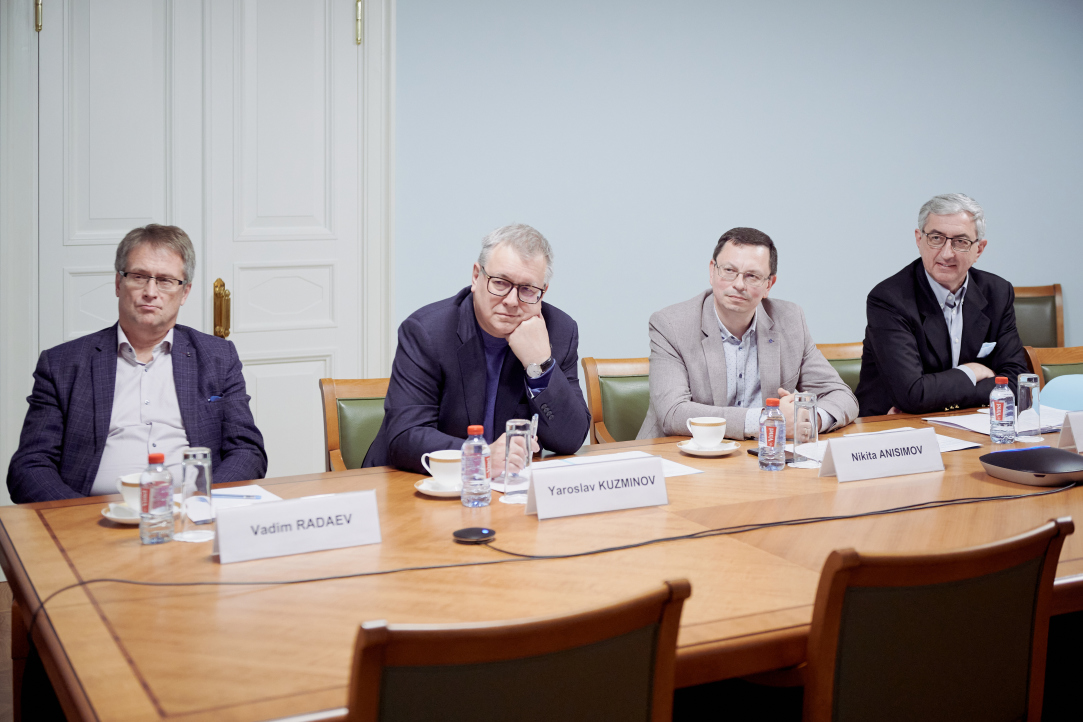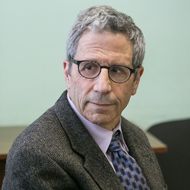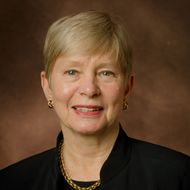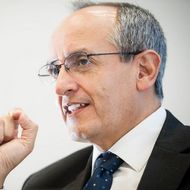‘The Expertise of Members of IAC Will Be Instrumental in the Continuing Development of the University’

On October 5, HSE University’s International Advisory Committee held an online session. Yaroslav Kuzminov, HSE University Academic Supervisor, introduced the new leadership structure of the University and Rector Nikita Anisimov spoke about his vision for HSE University’s development. Meeting participants discussed various aspects of the University strategy.
Yaroslav Kuzminov, HSE University Academic Supervisor, thanked all the members of the International Advisory Committee for their commitment to the university and for their role in helping develop HSE University and its programmes.
We always receive valuable feedback from you and through our interaction we feel part of the global community
The meeting of IAC took place on the next day after the winners of two grant contests for the development of Russian universities had been announced by the Russian government.
HSE University has been awarded two major grants–it is among six universities to receive substantial funding for AI research and also among the winners of Priority 2030 initiative that replaces Russian Academic Excellence Project 5-100.
‘These two important victories will shape our development for the next decade,’ said Professor Kuzminov. He then introduced the new rector to the members of IAC.
Nikita Anisimov, HSE University Rector emphasized the pivotal role of IAC in making HSE University what it is today, the beacon of Russian education, which sets the benchmark in Russian education and paves the way forward. He thanked all the members of IAC for their invaluable contribution to this remarkable achievement.

Nikita Anisimov, HSE University Rector
‘As members of IAC, you are actively involved in HSE University life and know the university inside out. We value your support and help and your willingness to respond to our requests for feedback. The expertise of members of IAC will be instrumental in the continuing development of the university. We would like to be able to count on your continuing cooperation, and your feedback on our new strategic development programme.’
Speaking about HSE’s goals going forward, Rector Anisimov emphasized that the university has far-reaching plans that involve further development of interdisciplinary research, natural sciences, business education, digital university, online education, and internationalization.
HSE University is facing new challenges, many of which are of international nature. The ideas and solutions put forward by IAC members will help identify the university’s strategic priorities, determine the course of action in each field, find new areas for strategic projects, create research collaborations, foster communication between professors, and build favourable conditions for early career researchers.

Eric Maskin, the Chairman of the IAC, Adams University Professor at Harvard University, Nobel laureate in Economics, 2007
It’s a pleasure to have the opportunity to meet you, Mr Anisimov, even if only virtually. I look forward to working with you over the years. I’d like to thank your predecessor, Rector Kuzminov, who served as Rector for many successful years. I’m glad that you, Yaroslav, will be continuing as the Academic Supervisor. It’s important that we continue to benefit from your wisdom.
Answering Professor Maskin’s question about any anticipated changes to the university development, Mr Anisimov highlighted three major aspects: a turn towards a polydisciplinary approach within major research projects, greater speed of response to global changes, and the ability of the university to participate in driving the global agenda. This will require introducing certain changes to the way the university operates. The changes will help better position the university on the global education scene.
Daniel Treisman, Professor in the Department of Political Science, University of California, Los Angeles raised a question concerning the context of HSE’s development and the opportunities and challenges the university is facing. Rector Anisimov stressed that research and education is a sphere where international cooperation has always been able to thrive and HSE University is one of the symbols of international cooperation for the whole country’s educational system.
‘Russian institutions look up to HSE University as we lead the way terms of how we interact with international organizations. We organize international intellectual contests and are involved in other projects. I believe that university cooperation and good contacts with the diplomatic community including at the ambassador level is something that can foster the development of a global university.’
Speaking about HSE’s general profile, Timothy J. Colton, member of IAC, Chair of the Department of Government at Harvard University, was interested in Rector Anisimov’s take on the possible tradeoffs between the original concrete focus on social sciences and economics and the fusion to many different subjects. ‘It’s called Higher School of Economics but some members of the staff have referred to it as Higher School of Everything. It’s expanded from being a social science and economics organization to one that does many things.’
Rector Anisimov agreed that it is a hotly debated issue in Russia as well but noted that in Russia HSE University has become a symbol of educational success—If a young person enrolls at HSE, it’s a building block of their success. ‘As a rector of two universities before HSE, I should say that there is no turning back. I feel that the only option for us is to go forward. HSE University now is certainly something more than the Higher School of Economics. However, it will definitely require further serious work with the university brand and the marketing strategy,’ he added.

Philip Altbach, member of IAC, Founding Director, Center for International Higher Education at Boston College
We realize that HSE University has become a comprehensive university. Most of the IAC members would stress that HSE should keep its strength in social science. This is what the university is known for globally. For Russia, it’s very important to have a really strong internationally recognized institution in economics and broader social sciences as well.
Yaroslav Kuzminov, Academic Supervisor of HSE
I think that we keep our position as a major player in the academic sphere in the field of economics and social studies. This is supported by the role of our university as the government’s analytical and expert centre involved in the development of social and economic reforms, which provides us with an enormous amount of empirical material and enables us to test our theories. That said, we have prepared a number of strategic projects for the next 10 years. Each project has an economics and social science core complemented by serious research in maths, computer science, biology, biochemistry, etc.
Modern level of social studies is not possible without relying on big data and understanding the processes driven by the digital revolution
Our expansion is quite natural—we do not mechanically add new fields. Instead, we invite experts whose work is important for our core topics, which are economics and social sciences. This is a key feature that distinguishes HSE from other schools.
Secondly, we have two key fields of research that help us achieve greater international recognition. These are cognitive science and fundamental mathematics, and additionally computer science. These areas are no less important and HSE University has built a solid reputation in these fields, which is stronger at times than in our traditional areas of focus on social sciences and economics. We are a comprehensive university indeed and these are the pillars for our development.
Patti Peterson, Senior Fellow at Center for Internationalization and Global Engagement, American Council on Education, commented that with the rise of mathematics side of economics and computer science around the world it becomes increasingly obvious that the development of these disciplines needs to be informed by robust social sciences and humanities – such disciplines as political science, sociology, philosophy.

Patti Peterson, Senior Fellow at Center for Internationalization and Global Engagement, American Council on Education
If those areas are not robust in their development, you do not have a comprehensive university of great quality. As a comprehensive university with a very strong fabric, I hope you will also be attending to the development of other parts of social sciences and humanities.
Mr Kuzminov noted that HSE is the only university in Russia that has supported the development of Philosophy projects and has consistently funded them. HSE University is also the only university to have created an Institute of Classical Studies that focuses on antiquity, ancient China and Asia, early Christianity, and the Arab world. The university also cooperates with religious educational institutions in theology studies.
'Universities have an important mission to broadcast and replicate culture. We need to use the social approach as something that would shape our development as a comprehensive university.'

Francisco Marmolejo, Education Advisor, Qatar Foundation
I would like to express appreciation for Yaroslav Kuzminov and welcome the new leadership. All of us have gained significant appreciation for the role HSE University plays in Russia and internationally. The university should consider strengthening its international outreach – not only in traditional ways but also by being creative, bold, and innovative in finding new disruptive ways to lead the way in higher education in Russia and globally.
The next meeting of the International Advisory Committee is to take place online on December 1. Several new members will be joining the IAC as mandates of some of the current members are coming to an end. The main focus of the discussion at the December meeting will be the university’s development programme in the framework of the Russian Government’s Priority 2030 initiative.
Philip G. Altbach
Member of the International Advisory Committee
Nikita Anisimov
HSE University Rector
Yaroslav Kuzminov
HSE University Academic Supervisor
Eric S. Maskin
Chairman of the International Advisory Committee
See also:
IAC Welcomes New Members and Discusses HSE University Development
On December 1, key areas of HSE University’s recently adopted strategy were presented at the extended meeting of the International Advisory Committee. Outgoing and new members of IAC learnt more about the University’s initiatives in human capital and AI research, as well as about its plans to build a Master’s Engineering School.
International Advisory Committee Meeting Focuses on HSE University’s Third Mission
On May 31, International Advisory Committee met online to discuss HSE University’s third mission, its implementation and place in the university strategy. The meeting focused on HSE University’s volunteering and social initiatives, cooperation with non-profits, community engagement, students’ field research trips around Russia, and HSE Business Incubator.
International Advisory Committee Convenes to Discuss HSE University’s Domestic Partnership Programmes
On February 17, HSE University’s International Advisory Committee met over Zoom to discuss the University’s recent activity and the progress of a number of projects being implemented under HSE University’s University Partnership Programme, which aims to strengthen partnerships and academic collaboration between HSE and other universities in Russia.
University Codes of Conduct Should Be Concise and Precise
The HSE University International Advisory Committee met online on May 19 to discuss the proposed Codes of Conduct for faculty and students, as well as assess the university’s transition to online learning.
International Advisory Committee Recommends a More Focused Approach
Members of the International Advisory Committee (IAC) and the HSE administration have discussed the results of the committee’s annual meeting.
‘We Are Very Excited by How HSE Continues to Develop’
The eighth annual session of the HSE International Advisory Committee has come to a close. Its chairman Eric Maskin, Nobel laureate in economics, summed up the results of the committee’s work.
International Advisory Committee Meets at HSE: 'The University Is Quick to Respond to Recommendations'
Each year, the HSE International Advisory Committee (IAC) meets in Moscow under the leadership of Nobel laureate Eric Maskin. Committee members focus on reorganising the post-graduate school, updating educational and staffing policies, and a number of other important issues.
The University’s Development Is Not an Administrative Process, But a Creative One
HSE Vice Rector Ivan Prostakov discusses the results of a recent International Advisory Committee (IAC) meeting, as well as the priorities the university has set for its international activities.
‘Improvement at HSE Has Exceeded Our Expectations’
Last week HSE International Advisory Committee held its annual meeting in Moscow. Eric Maskin, Nobel laureate in Economics, 2007, Chairman of the Committee and members of the IAC have talked to HSE News Service about the results of the meeting.
Why Rankings Matter for Universities
University rankings, which increasingly impact both universities' development strategies and state policy in higher education, was one of the main topics discussed at the meeting of the HSE's International Advisory Committee.


